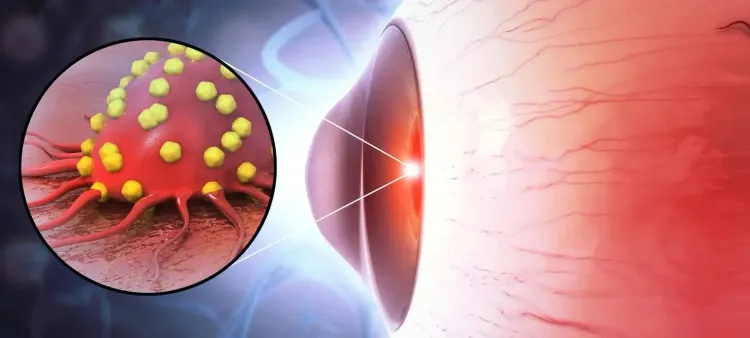Research Unveils Innovative Drug Delivery System for Rare Eye Cancer

Synopsis
Key Takeaways
- A new drug delivery system shows improved efficacy for rare eye cancer treatment.
- The study led by Moffitt Cancer Center highlights significant patient benefits.
- Median progression-free survival increased to 9.1 months.
- Approved by the FDA in August 2023.
- Further research is needed to confirm long-term benefits.
New Delhi, April 11 (NationPress) A group of researchers from the United States has discovered an innovative drug delivery system that demonstrates enhanced efficacy in treating a rare form of eye cancer that metastasizes to the liver.
The collaborative study, spearheaded by the Moffitt Cancer Center in Florida, has revealed that percutaneous hepatic perfusion utilizing a melphalan hepatic delivery system may benefit patients suffering from metastatic uveal melanoma (mUM)—a cancer known for its challenging treatment and traditionally unfavorable prognosis.
The Melphalan/Hepatic Delivery System is a combination of a drug and medical device designed for liver-targeted treatment of patients with unresectable mUM.
This investigation evaluated the safety and effectiveness of the melphalan hepatic delivery system in comparison to the best available alternative care.
Results published in the Annals of Surgical Oncology illustrated that treatment with the melphalan hepatic delivery system significantly aids in controlling cancer within the liver.
“This novel treatment brings hope to individuals battling this historically difficult-to-treat cancer,” remarked lead author Jonathan Zager, a surgical oncologist in the Cutaneous Oncology Department at Moffitt.
“This approach offers a solution that does not compromise their quality of life and provides patients with a better chance for prolonged survival,” Zager added.
During clinical trials, one cohort of patients received treatment using the melphalan hepatic delivery system, while another group underwent standard-care treatment.
Compared to those receiving alternative treatments, patients treated with the melphalan hepatic delivery system exhibited significantly better outcomes.
The study reported a median progression-free survival of 9.1 months for these patients, in contrast to 3.3 months for those on conventional therapies.
The disease control rate also markedly rose from 46.9 percent to 80.0 percent.
Patients treated with the melphalan hepatic delivery system achieved a median survival of 18.5 months, compared to 14.5 months for those receiving other treatment modalities.
While some side effects were noted, primarily concerning blood cell counts, these were managed with standard care as outpatients and largely resolved with mere observation.
The melphalan hepatic delivery system received approval from the US Food and Drug Administration in August 2023.
In contrast to traditional chemotherapy, this method administers a concentrated dose of the drug directly into the liver, which is isolated using a series of catheters and balloons through percutaneous insertions.
The chemotherapy is filtered before it is allowed to enter the rest of the body. This targeted technique helps minimize adverse effects elsewhere in the body.
Nonetheless, further research is necessary to fully evaluate the benefits of the melphalan hepatic delivery system.









